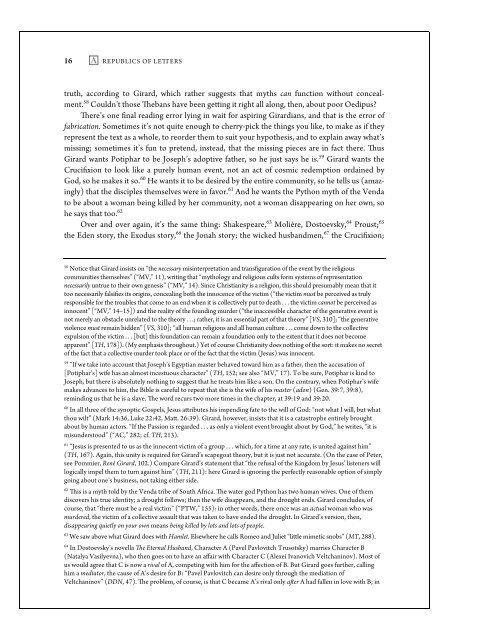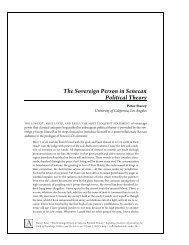Deceit, Desire, and the Literature Professor: Why Girardians Exist
Deceit, Desire, and the Literature Professor: Why Girardians Exist
Deceit, Desire, and the Literature Professor: Why Girardians Exist
You also want an ePaper? Increase the reach of your titles
YUMPU automatically turns print PDFs into web optimized ePapers that Google loves.
16 REPUBLICS OF LETTERS<br />
truth, according to Girard, which ra<strong>the</strong>r suggests that myths can function without concealment.<br />
58 Couldn’t those Thebans have been getting it right all along, <strong>the</strong>n, about poor Oedipus?<br />
There’s one final reading error lying in wait for aspiring <strong>Girardians</strong>, <strong>and</strong> that is <strong>the</strong> error of<br />
fabrication. Sometimes it’s not quite enough to cherry-pick <strong>the</strong> things you like, to make as if <strong>the</strong>y<br />
represent <strong>the</strong> text as a whole, to reorder <strong>the</strong>m to suit your hypo<strong>the</strong>sis, <strong>and</strong> to explain away what’s<br />
missing; sometimes it’s fun to pretend, instead, that <strong>the</strong> missing pieces are in fact <strong>the</strong>re. Thus<br />
Girard wants Potiphar to be Joseph’s adoptive fa<strong>the</strong>r, so he just says he is. 59 Girard wants <strong>the</strong><br />
Crucifixion to look like a purely human event, not an act of cosmic redemption ordained by<br />
God, so he makes it so. 60 He wants it to be desired by <strong>the</strong> entire community, so he tells us (amazingly)<br />
that <strong>the</strong> disciples <strong>the</strong>mselves were in favor. 61 And he wants <strong>the</strong> Python myth of <strong>the</strong> Venda<br />
to be about a woman being killed by her community, not a woman disappearing on her own, so<br />
he says that too. 62<br />
Over <strong>and</strong> over again, it’s <strong>the</strong> same thing: Shakespeare, 63 Molière, Dostoevsky, 64 Proust; 65<br />
<strong>the</strong> Eden story, <strong>the</strong> Exodus story, 66 <strong>the</strong> Jonah story; <strong>the</strong> wicked husb<strong>and</strong>men, 67 <strong>the</strong> Crucifixion;<br />
58 Notice that Girard insists on “<strong>the</strong> necessary misinterpretation <strong>and</strong> transfiguration of <strong>the</strong> event by <strong>the</strong> religious<br />
communities <strong>the</strong>mselves” (“MV,” 11), writing that “mythology <strong>and</strong> religious cults form systems of representation<br />
necessarily untrue to <strong>the</strong>ir own genesis” (“MV,” 14). Since Christianity is a religion, this should presumably mean that it<br />
too necessarily falsifies its origins, concealing both <strong>the</strong> innocence of <strong>the</strong> victim (“<strong>the</strong> victim must be perceived as truly<br />
responsible for <strong>the</strong> troubles that come to an end when it is collectively put to death . . . <strong>the</strong> victim cannot be perceived as<br />
innocent” [“MV,” 14–15]) <strong>and</strong> <strong>the</strong> reality of <strong>the</strong> founding murder (“<strong>the</strong> inaccessible character of <strong>the</strong> generative event is<br />
not merely an obstacle unrelated to <strong>the</strong> <strong>the</strong>ory . . .; ra<strong>the</strong>r, it is an essential part of that <strong>the</strong>ory” [VS, 310]; “<strong>the</strong> generative<br />
violence must remain hidden” [VS, 310]; “all human religions <strong>and</strong> all human culture . . . come down to <strong>the</strong> collective<br />
expulsion of <strong>the</strong> victim . . . [but] this foundation can remain a foundation only to <strong>the</strong> extent that it does not become<br />
apparent” [TH, 178]). (My emphasis throughout.) Yet of course Christianity does nothing of <strong>the</strong> sort: it makes no secret<br />
of <strong>the</strong> fact that a collective murder took place or of <strong>the</strong> fact that <strong>the</strong> victim (Jesus) was innocent.<br />
59 “If we take into account that Joseph’s Egyptian master behaved toward him as a fa<strong>the</strong>r, <strong>the</strong>n <strong>the</strong> accusation of<br />
[Potiphar’s] wife has an almost incestuous character” (TH, 152; see also “MV,” 17). To be sure, Potiphar is kind to<br />
Joseph, but <strong>the</strong>re is absolutely nothing to suggest that he treats him like a son. On <strong>the</strong> contrary, when Potiphar’s wife<br />
makes advances to him, <strong>the</strong> Bible is careful to repeat that she is <strong>the</strong> wife of his master (adon) (Gen. 39:7, 39:8),<br />
reminding us that he is a slave. The word recurs two more times in <strong>the</strong> chapter, at 39:19 <strong>and</strong> 39:20.<br />
60 In all three of <strong>the</strong> synoptic Gospels, Jesus attributes his impending fate to <strong>the</strong> will of God: “not what I will, but what<br />
thou wilt” (Mark 14:36, Luke 22:42, Matt. 26:39). Girard, however, insists that it is a catastrophe entirely brought<br />
about by human actors. “If <strong>the</strong> Passion is regarded . . . as only a violent event brought about by God,” he writes, “it is<br />
misunderstood” (“AC,” 282; cf. TH, 213).<br />
61 “Jesus is presented to us as <strong>the</strong> innocent victim of a group . . . which, for a time at any rate, is united against him”<br />
(TH, 167). Again, this unity is required for Girard’s scapegoat <strong>the</strong>ory, but it is just not accurate. (On <strong>the</strong> case of Peter,<br />
see Pommier, René Girard, 102.) Compare Girard’s statement that “<strong>the</strong> refusal of <strong>the</strong> Kingdom by Jesus’ listeners will<br />
logically impel <strong>the</strong>m to turn against him” (TH, 211): here Girard is ignoring <strong>the</strong> perfectly reasonable option of simply<br />
going about one’s business, not taking ei<strong>the</strong>r side.<br />
62 This is a myth told by <strong>the</strong> Venda tribe of South Africa. The water god Python has two human wives. One of <strong>the</strong>m<br />
discovers his true identity; a drought follows; <strong>the</strong>n <strong>the</strong> wife disappears, <strong>and</strong> <strong>the</strong> drought ends. Girard concludes, of<br />
course, that “<strong>the</strong>re must be a real victim” (“PTW,” 155): in o<strong>the</strong>r words, <strong>the</strong>re once was an actual woman who was<br />
murdered, <strong>the</strong> victim of a collective assault that was taken to have ended <strong>the</strong> drought. In Girard’s version, <strong>the</strong>n,<br />
disappearing quietly on your own means being killed by lots <strong>and</strong> lots of people.<br />
63 We saw above what Girard does with Hamlet. Elsewhere he calls Romeo <strong>and</strong> Juliet “little mimetic snobs” (MT, 288).<br />
64 In Dostoevsky’s novella The Eternal Husb<strong>and</strong>, Character A (Pavel Pavlovitch Trusotsky) marries Character B<br />
(Natalya Vasilyevna), who <strong>the</strong>n goes on to have an affair with Character C (Alexei Ivanovich Veltchaninov). Most of<br />
us would agree that C is now a rival of A, competing with him for <strong>the</strong> affection of B. But Girard goes fur<strong>the</strong>r, calling<br />
him a mediator, <strong>the</strong> cause of A’s desire for B: “Pavel Pavlovitch can desire only through <strong>the</strong> mediation of<br />
Veltchaninov” (DDN, 47). The problem, of course, is that C became A’s rival only after A had fallen in love with B; in



